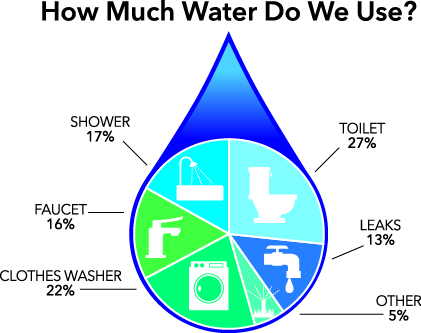
Sustainable Homes: Mastering Water Conservation
In the pursuit of sustainable living, water conservation at home plays a pivotal role. By adopting mindful practices and implementing water-efficient technologies, individuals can contribute to a more water-conscious and environmentally friendly lifestyle. Explore practical tips for water conservation within your home.
Understanding the Importance of Water Conservation
Water is a finite resource, and the increasing demand for it poses a significant environmental challenge. Conserving water at home is essential for preserving water supplies, reducing energy consumption related to water treatment, and safeguarding ecosystems. Every drop saved at the household level contributes to the broader effort of ensuring water sustainability.
Efficient Water Fixtures and Appliances
One of the most effective ways to conserve water at home is by installing water-efficient fixtures and appliances. Low-flow toilets, aerated faucets, and Energy Star-rated dishwashers and washing machines can significantly reduce water consumption. Upgrading to modern, water-saving technologies ensures efficient use without compromising performance.
Mindful Water Usage in Daily Activities
Simple changes in daily activities can have a substantial impact on water conservation. Turning off the tap while brushing teeth, taking shorter showers, and fixing leaks promptly are easy yet impactful practices. These mindful habits not only save water but also contribute to lower water bills, promoting economic and environmental sustainability.
Collecting and Reusing Rainwater
Harvesting rainwater provides an alternative water source for various household uses. Installing rain barrels or cisterns allows homeowners to collect rainwater from rooftops, which can then be used for watering plants, landscaping, or even flushing toilets. This sustainable practice reduces reliance on traditional water sources.
Landscaping with Water-Efficient Plants
Landscaping choices significantly impact water usage. Opt for native and drought-resistant plants that require less water to thrive. Mulching around plants helps retain soil moisture, reducing the frequency of irrigation. Additionally, consider xeriscaping principles, which prioritize water-efficient landscaping designs.
Smart Irrigation Systems
Traditional irrigation methods can be inefficient and wasteful. Upgrading to smart irrigation systems with moisture sensors, weather data integration, and programmable timers ensures that outdoor watering aligns with actual needs. These systems adjust watering schedules based on environmental conditions, optimizing water usage.
Greywater Recycling for Non-Potable Use
Greywater, which includes water from bathroom sinks, showers, and laundry, can be repurposed for non-potable uses. Installing greywater recycling systems allows homeowners to divert this water for irrigation or flushing toilets. This approach reduces the demand on freshwater sources for non-drinking purposes.
Educational Outreach and Community Initiatives
Promoting water conservation extends beyond individual efforts. Engaging in educational outreach and community initiatives raises awareness about the importance of water conservation. Collaborating with neighbors, participating in local water-saving campaigns, and supporting community projects contribute to a collective and impactful approach.
Regular Maintenance and Leak Detection
Regularly maintaining plumbing systems and promptly addressing leaks are crucial aspects of water conservation. A small, unnoticed leak can lead to significant water wastage over time. Periodic checks, timely repairs, and incorporating leak detection technology help mitigate water losses and ensure an efficient home water system.
Monitoring Water Usage with Technology
Advancements in technology offer tools to monitor and manage home water usage effectively. Smart water meters and monitoring apps provide real-time insights into water consumption patterns. This information empowers homeowners to make informed decisions, identify areas for improvement, and track progress in water conservation efforts.
To explore more about water conservation at home and discover additional tips for sustainable living, visit Water Conservation at Home. By adopting water-conscious practices, individuals contribute to the global effort to preserve this precious resource for future generations.
